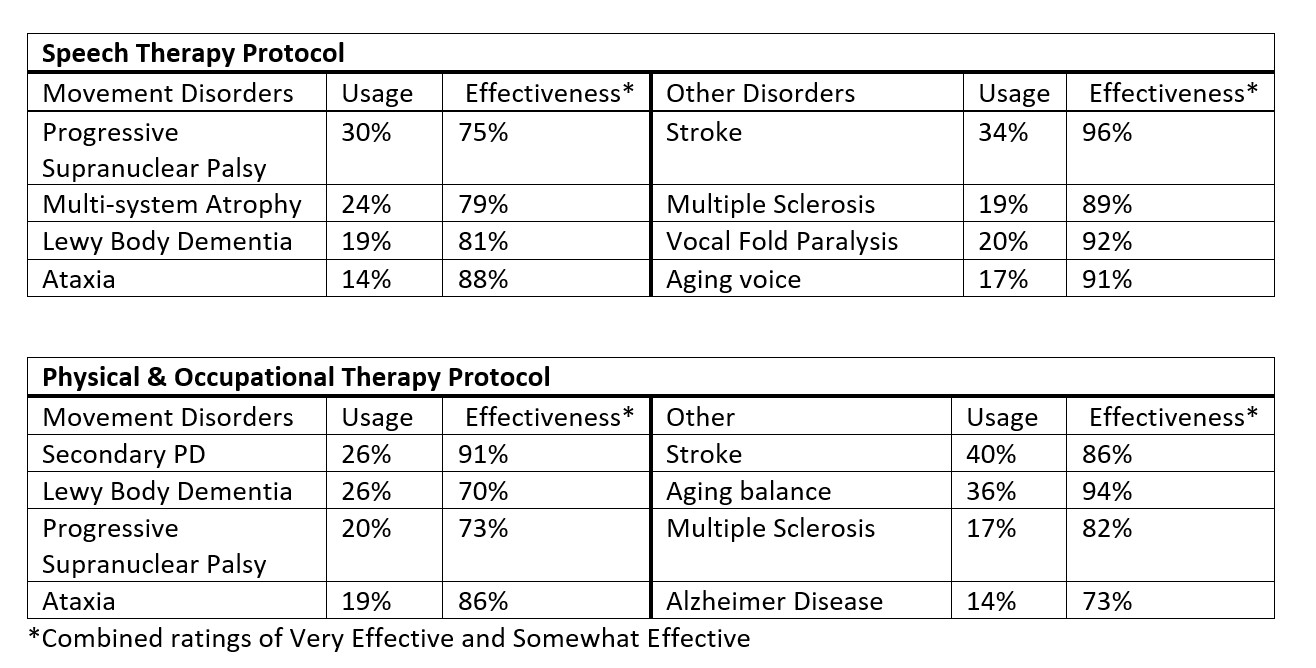Objective: 1) Examine how speech, physical and occupational therapists are using evidence-based, Parkinson’s specific treatments (LSVT LOUD and LSVT BIG) in atypical parkinsonisms, other movement disorders and aging conditions beyond PD; 2) explore therapists’ perceived outcomes and challenges in applying these treatments to non-PD disorders.
Background: Standardized, evidence-based speech, physical and occupational therapies (LSVT LOUD and LSVT BIG) have been developed for people with PD. Published evidence on these therapies include three RCTs for speech treatment and two RCTs for physical and occupational therapy [1-6]. Although the foundational research on these treatment protocols is in people with PD, principles of neuroplasticity and motor learning built into the protocols may be effective with non-PD conditions [7-8]. Single-subject and small group studies on these protocols have shown promise for non-PD diagnoses [9-11]. The goal of this study was to explore use of these treatments in non-PD conditions.
Method: An online survey was sent to speech, physical and occupational therapists certified in these protocols in 6 English speaking countries. 248 speech therapists and 541 physical and occupational therapists responded.
Results: 75% of speech therapists and 79% of physical and occupational therapists reported using these evidence-based protocols beyond PD. The most common movement disorders and other non-PD conditions treated, along with therapists’ perceptions of effectiveness, are summarized below:
[Table 1]
Comments from therapists noted that cognitive impairments were the greatest patient challenge for success, and intensity of dosage was the greatest logistical challenge.
Conclusion: Rehabilitation research is lacking for many movement disorders and other neurological or aging conditions beyond PD. These findings enlighten our understanding of use of LSVT LOUD and LSVT BIG in conditions beyond PD and can help direct research efforts and clinical training to improve communication, function, mobility and quality of life in these patients.
References: [1] Ramig, L., Countryman, S., Thompson, L., & Horii, Y. (1995). A comparison of two forms of intensive speech treatment for Parkinson disease. Journal of Speech and Hearing Research, 38, 1232-1251. [2] Ramig, L., Sapir, S., Countryman, S., Pawlas, A., O’Brien, C., Hoehn, M., & Thompson, L. (2001). Intensive voice treatment (LSVT®) for patients with Parkinson’s disease: a 2 year follow up. Journal of Neurology, Neurosurgery, and Psychiatry, 71(4), 493–498. http://doi.org/10.1136/jnnp.71.4.493 [3] Ramig, L., Sapir, S., Fox, C., & Countryman, S. (2001). Changes in vocal intensity following intensive voice treatment (LSVT®) in individuals with Parkinson disease: A comparison with untreated patients and normal age-matched controls. Movement Disorders, 16, 79-83. [4] Ramig, L.O., Halpern, A., Spielman, J., Fox, C., & Freeman, K. (2018). Speech treatment in Parkinson’s Disease: Randomized Controlled Trial (RCT). Movement Disorders, 1-15. https://doi.org/10.1002/mds.27460 [5] Ebersbach, G., Ebersbach, A., Edler, D., Kaufhold, O., Kusch, M., Kupsch, A., & Wissel, J. (2010). Comparing exercise in Parkinson’s disease–the Berlin LSVT® BIG study. Movement Disorders, 25(12), 1902-8. [6] Ebersbach, G., Grust, U., Ebersbach, A., Wegner, B., Gandor, F., & Kuhn, A. A. (2015). Amplitude-oriented exercise in Parkinson’s disease: A randomized study comparing LSVT-BIG and a short training protocol. Journal of Neural Transmission, 122(2), 253-256. https://doi.org/10.1007/s00702-014-1245-8 [7] Fox, C., Ramig, L., Ciucci, M., Sapir, S., McFarland, D.H.., & Farley, B. (2006). Science and Practice of LSVT/LOUD: Neural plasticity-principled approach to treating individuals with Parkinson disease and other neurological disorders. Seminars in Speech and Language, 27, 283-299. [8] Kleim, J. A., & Jones, T. A. (2008). Principles of experience-dependent neural plasticity: Implications for rehabilitation after brain damage. Journal of Speech, Language, and Hearing Research, 51(1), S225-S239. https://doi.org/10.1044/1092-4388(2008/018) [9] Metcalfe, V., Egan, M., Sauvé-Schenk, K. (2019) LSVT BIG in late stroke rehabilitation: A single-case experimental design study. Canadian Journal of Occupational Therapy, 86(2):87-94. doi: 10.1177/0008417419832951 [10] Sapir, S., Spielman, J., Countryman, S., Ramig, L., Hinds, S., Fox, C., & Story, B. (2003). Phonatory and articulatory changes in ataxic dysarthria following intensive voice therapy with the LSVT®: A single subject study. American Journal of Speech-Language Pathology, 12, 387-399. [11] Countryman, S., Ramig, L., & Pawlas, A. (1994). Speech and voice deficits in Parkinsonian Plus syndromes: Can they be treated? Journal of Medical Speech-Language Pathology, 2(3), 211-225.
To cite this abstract in AMA style:
C. Fox, L. Guse, A. Halpern. Beyond Parkinson’s disease: the use of standardized speech, physical and occupational therapies for PD in atypical parkinsonisms, other movement disorders and aging conditions [abstract]. Mov Disord. 2020; 35 (suppl 1). https://www.mdsabstracts.org/abstract/beyond-parkinsons-disease-the-use-of-standardized-speech-physical-and-occupational-therapies-for-pd-in-atypical-parkinsonisms-other-movement-disorders-and-aging-conditions/. Accessed February 11, 2026.« Back to MDS Virtual Congress 2020
MDS Abstracts - https://www.mdsabstracts.org/abstract/beyond-parkinsons-disease-the-use-of-standardized-speech-physical-and-occupational-therapies-for-pd-in-atypical-parkinsonisms-other-movement-disorders-and-aging-conditions/

